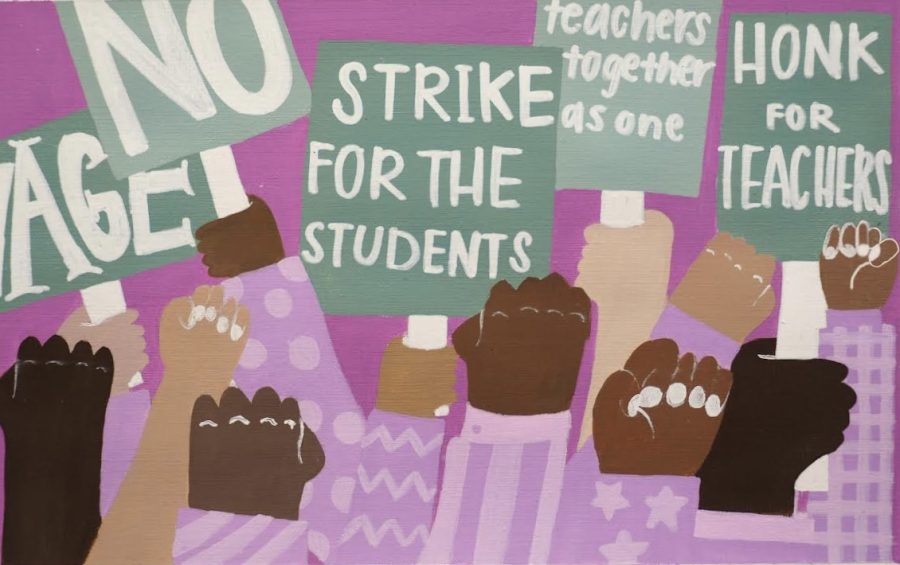Protecting Teachers’ Rights at Private School
The recent Minneapolis teacher strike has brought awareness to the differences between teacher rights at public and private schools.
On March 8, 2022, public school teachers in the Minneapolis district went on strike. Teachers were frustrated that schools were not meeting demands stipulated in their contracts. They asked for higher pay, smaller class sizes, and mental health support in schools, among other demands. Saint Paul teachers also threatened to strike, but reached a tentative agreement shortly before.
The reasons teachers strike vary, but often their demands are similar to the demands of the Minneapolis teacher’s union. The Minneapolis teachers want smaller class sizes, higher wages (including an 11,000 dollar increase in starting salary), and mental health professionals to support students and staff. They are also asking for greater pay for other employees of the school district, even those that don’t teach.
“I have a lot of sympathy and a lot of empathy for [the teachers]. I mean, especially one of the big points at least from the reading and the media with regards to Minneapolis is they have quite an extensive staff of non teaching staff that support them. So paraprofessionals that are really in many cases co-teaching with licensed teachers, and the idea that they’d like to get more salary for those folks. I think that that’s well deserved,” science teacher Mark Peterson said.
At public schools, teachers use unions to bargain for worker’s rights and protections. “[Unions are] an avenue that teachers have to, I guess the only power they have, to argue for what they want, if they feel rights are being disregarded or not listened to and they’ve tried different things,” English teacher Barbara Watson said.
At BSM and other private schools, teachers are not members of unions. Instead of working with a union to voice complaints or concerns, BSM teachers don’t always have a clear protocol for working through problems with their superiors. Watson taught at a handful of public schools before working at BSM. Compared to the public school environment, she thinks private schools make it harder for teachers to talk through issues.
“Sometimes there’s not a place to go other than to your superior…if you feel like you’re being mistreated in some way. So it’s sometimes a little unclear. Or, or you can feel less comfortable talking about something you feel that might not be right with your job,” Watson said.
Additionally, private schools don’t offer the same protections for teacher’s rights as public schools and unions do. “lf you have something happen in your job where you need lawyer support, unions will give you a lawyer to kind of fight through this system as well,” Watson said.
If a teacher at BSM is called in front of their superior, they have to handle the situation on their own. “If there’s some question of misconduct or something happens in your classroom [at a public school], every building has a teacher advocate…There’s also insurance that goes along with that. If I was to get sued in a public school, the union would pick up the tab for that. We don’t have anything like that…You’re kind of on your own to those types of things,” Peterson said.
Although BSM teachers don’t have the same protocols as union members, they already have access to a lot of the resources that the Minneapolis teachers are fighting for.
“One of the other points at Minneapolis is mental health. We have ample access to [those resources] where many buildings in the public school system have to share stuff like that…I know class size is a big issue. We really don’t have to deal with that,” Peterson said.
Although unions offer much protection, they are also expensive, especially when teachers salaries are low. “I think my last year [at public school], which was seven years ago, was like $1,000 a year. So you pay your union dues,” Peterson said.
Public school teachers who do strike are sometimes vilified for choosing to do so. Strikes keep kids out of school, and parents sometimes accuse teachers of being selfish for putting their needs above the children.
“I think what a lot of people don’t realize is before it gets to that point, there’s a lot of steps in place to follow before it becomes a teacher strike. That’s like a last resort. I think there can be misunderstanding as to why the teachers are striking; it can kind of seem like teachers are being selfish or something like that. But when it’s really a last resort, have we tried everything we could to solve the problem and it still didn’t get solved,” Watson said.
Although they can be disruptive, strikes are also effective. This week, Minneapolis teachers on strike reached an agreement, and they approved a contract that catered to many of their demands. To compensate for the lost time in school, Minneapolis students will go to school a few extra weeks in the summer and 42 minutes more each school day.




































![Teacher Lore: Mr. Hillman [Podcast]](https://bsmknighterrant.org/wp-content/uploads/2025/03/teacherlorelogo-1200x685.png)






